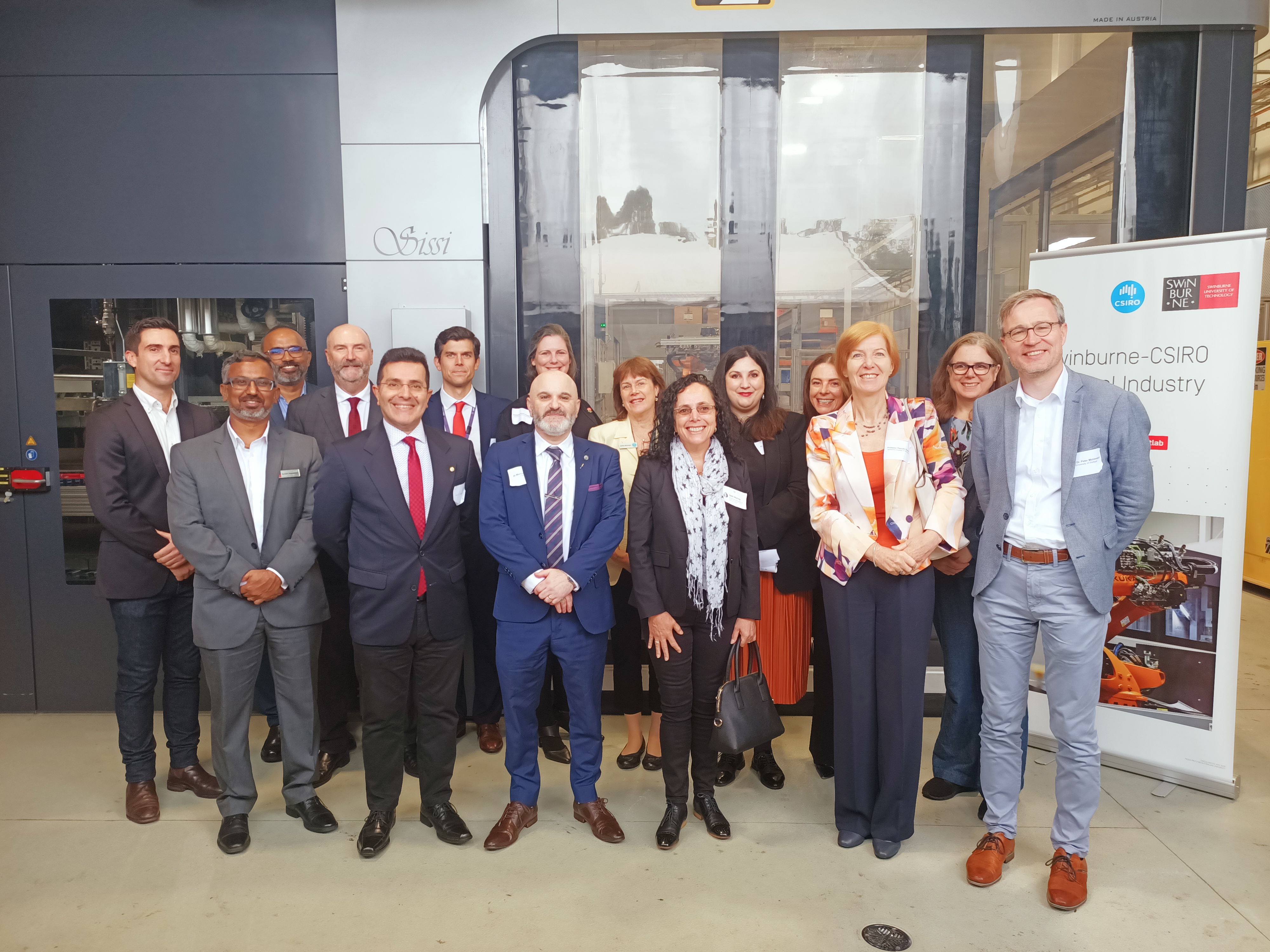CSIRO and Swinburne level up Australia’s manufacturing sector with Industry 4.0 Testlab

The Testlab has showcased its world-first fully automated industrial-scale production facility using a 3D-printing approach to composite component creation.
In summary
- The future of Australian manufacturing is being built at the Swinburne-CSIRO National Industry 4.0 Testlab
- The Testlab includes a world-first process for the additive manufacturing of carbon fibre composite materials
- Its world-first fully automated industrial-scale production facility uses a 3D-printing approach to composite component creation
The future of Australian manufacturing is being built now at the Swinburne-CSIRO National Industry 4.0 Testlab, including a world-first process for the additive manufacturing of carbon fibre composite materials.
Today, the Testlab showcased its world-first fully automated industrial-scale production facility using a 3D-printing approach to composite component creation.
The showcase was attended by Member for Chisholm Dr Carina Garland MP, one year on from the federal government announcing their Rebuilding Australian manufacturing agenda to revitalise Australia’s industrial capability and manufacturing.
Swinburne Chief Scientist Professor Virginia Kilborn says the university is proud to be one of Australia’s leading partners in the research and development of advanced manufacturing.
“Swinburne continues to deliver ground-breaking digital techniques to push Australia to the forefront of manufacturing carbon fibre composite components. Our tech-led approach promotes widespread adoption of Industry 4.0 standards and digital twins, to help secure Australia’s manufacturing future.”
Based at CSIRO’s Clayton facility, the Swinburne-CSIRO National Industry 4.0 Testlab supports innovative research and development for Swinburne’s Aerostructures Innovation Research (AIR) Hub, Victorian Hydrogen Hub, ARC Research Hub for Future Digital Manufacturing, and collaborations with CSIRO's Data61 arm.
Industry 4.0 Testlab Research Director Professor Boris Eisenbart is thrilled to share the incredible work of Swinburne and CSIRO through the National Industry 4.0 Testlab.
“Testlab is already supporting groundbreaking projects in areas like aerospace, automotive, 3D printing and digital twinning. This is only the start for this world-leading facility, and I am excited for what we can do next to continue to build our partnership with CSIRO and our industry network.”
The Global Innovation Linkages program project is another key initiative of the facility. Developing a highly automated, flexible approach to the manufacturing process, the project integrates world-first 3D fibre printing technology with a unique composite curing process and digitisation technologies. This will achieve a leap forward in increasing the production rates and quality of composite part manufacture, while significantly lowering the cost of production.
CSIRO's Chief Scientist Professor Bronwyn Fox is an integral part of the Swinburne and CSIRO community. Since holding previous positions as Swinburne’s Deputy Vice-Chancellor of Research and Enterprise and Director of Swinburne’s Factory of the Future, she is now also supervising PhD students undertaking projects with the Testlab.
Professor Fox is one of the many world-leading experts who will use this facility for innovative education, research and development outcomes in manufacturing for years to come.
“Australia’s future depends on having a world class advanced manufacturing capability and Testlab has been purpose-built on the cutting edge of what we need to succeed in the era of Industry 4.0," she says.
“It is a facility that gives us the ability to generate, translate and accelerate research, training and technology into opportunities and competitive advantage for Australia."
“Testlab’s real power is collaboration – it brings together the people, the capabilities and the intention to deliver benefits for the nation through generous collaboration between Swinburne, CSIRO and other key players in Australia’s research and innovation system.”
-
Media Enquiries
Related articles
-

- Astronomy
- Technology
- Health
- Science
- University
- Sustainability
- Engineering
Swinburne highly cited researchers reach the top in 12 fields
Ten Swinburne academics have been named on the Highly Cited Researchers 2025 list, released by Clarivate
Tuesday 02 December 2025 -

- Technology
- Health
- Science
- University
$1.2m ARC funding to boost national X-ray spectroscopy capability through Swinburne and QUT partnership
Swinburne has secured $1.2 million in the latest Australian Research Council Linkage Infrastructure, Equipment and Facilities scheme round
Tuesday 02 December 2025 -

- Astronomy
- Technology
- Science
- Engineering
Meet Swinburne’s Roo-ver Mission team
Roo-ver will be Australia's first lunar rover, and it’s being designed, built and tested in Australia. Swinburne is playing a key role in the design and construction of Roo-ver, through its involvement in the ELO2 Consortium.
Wednesday 26 November 2025 -

- Technology
- Health
- Science
- University
- Aviation
- Engineering
Swinburne’s Mobile Innovation Lab hits the road
Swinburne’s Mobile Innovation Lab is a cutting-edge mobile facility designed for research, industry collaboration, STEM education, training and outreach.
Thursday 06 November 2025 -

- Technology
- University
H3D secures Series A funding to advance AI design technology
Hearables 3D Pty Ltd (H3D), a Swinburne University of Technology investment, has secured $5.8 million in Series A funding to revolutionise the hearing and dental industries with their AI design software.
Friday 14 November 2025

